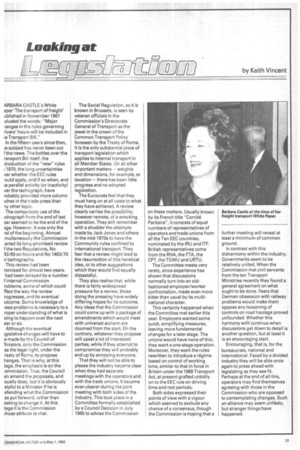Looking at
Page 25

If you've noticed an error in this article please click here to report it so we can fix it.
ARBARA CASTLE's White aper 'The transport of freight' ublished in November 1967 icluded the words: "Major lenges in the rules governing rivers' hours will be included in le Transport Bill."
In the fifteen years since then, le subject has never been out F the news. The battles over the ransport Bill itself, the ttroduction of the "new" rules 11970, the long uncertainties ver whether the EEC rules rould apply, and if so when, and le parallel activity (or inactivity) ver the tachograph, have robably provided more column iches in the trade press than ny other topic.
The compulsory use of the ichograph from the end of last ear seemed to be the end of the aga. However, it was only the nd of the beginning. Almost multaneously the Commission Carted its long-promised review f the two Regulations, No 43/69 on hours and No 1463/70 n tachographs.
This review had been romised for almost two years. had been delayed by a number f internal Commission
roblems, some of which could ffect the way the review rogresses, and its eventual utcome. Some knowledge of lese problems is necessary to a roper understanding of what is oing to happen over the next ear Or so.
Although the eventual :gislative changes will have to e made by the Council of linisters, only the Commission as the legal right, under the reaty of Rome, to propose hanges. That is why, at this tage, the emphasis is on the .ornmission. True, the Council an amend the proposals, and sually does, but it is obviously elpful to a Minister if he is efending what the Commission as put forward, rather than eeking to change it. At this tage it is the Commission those attitude is vital. The Social Regulation, as it is known in Brussels, is seen by veteran officials in the Commission's Directorate General of Transport as the jewel in the crown of the Common Transport Policy foreseen by the Treaty of Rome. It is the only substantial piece of transport legislation which applies to internal transport in all Member States. On all other important matters — weights and dimensions, for example, or taxation — there has been little progress and no adopted legislation.
The Eurocrats feel that they must hang on at all costs to what they have achieved. A review clearly carries the possibility, however remote, of a wrecking operation. They still remember with a shudder the attempts made by Jack Jones and others in the mid-1970s to have the Community rules confined to international transport. They fear that a review might lead to the resurrection of this heretical idea, or to other suggestions which they would find equally distasteful.
They also realise that, while there is fairly widespread pressure for a review, those doing the pressing have widely differing hopes for its outcome. Any ideas that the Commission could come up with a package of amendments which would meet with universal acclaim are doomed from the start. On the contrary, whatever they propose will upset a lot of interested parties, while if they attempt to compromise they will probably end up by annoying everyone.
That they will not be able to please the industry became clear when they had separate meetings with the operators and with the trade unions. It became even clearer during the joint meeting with both sides of the industry. This took place in a Committee formally established by a Council Decision in July 1965 to advise the Commission on these matters. Usually known by its French title "Comite Paritaire", it consists of equal numbers of representatives of operators and trade unions from all the Ten EEC countries, nominated by the IRU and ITF. British representatives come from the RHA, the FTA, the CPT, the TGWU and URTU.
The Committee meets very rarely, since experience has shown that discussions normally turn into an oldfashioned employer/worker confrontation, made even more bitter than usual by its multinational character.
This certainly happened when the Committee met earlier this year. Employers wanted some quick, simplifying measures, leaving more fundamental changes for a later stage. The unions would have none of this; they want a one-stage operation. Moreover, they want the rules rewritten to introduce a regime based on control of working time, similar to that in force in Britain under the 1968 Transport Act, at present grafted untidily on to the EEC rule on driving time and rest periods.
Both sides expressed their points of view with a vigour which seemed to exclude any chance of a consensus, though the Commission is hoping that a further meeting will reveal at least a minimum of common ground.
In contrast with this disharmony within the industry, Governments seem to be relatively united. When the Commission met civil servants from the ten Transport Ministries recently they found a general agreement on what ought to be done. Fears that German obsession with railway problems would make them oppose any loosening of controls on road haulage proved unfounded. Whether this harmony willl continue when discussions get down to detail is another question, but at least it is an encouraging start. Encouraging, that is, for the bureaucrats, national and international. Faced by a divided industry they will be able once again to press ahead with legislating as they see fit. Perhaps at the end of all this, operators may find themselves agreeing with those in the Commission who are opposed to contemplating changes. Such an alliance may seem unlikely, but stranger things have happened.




































































